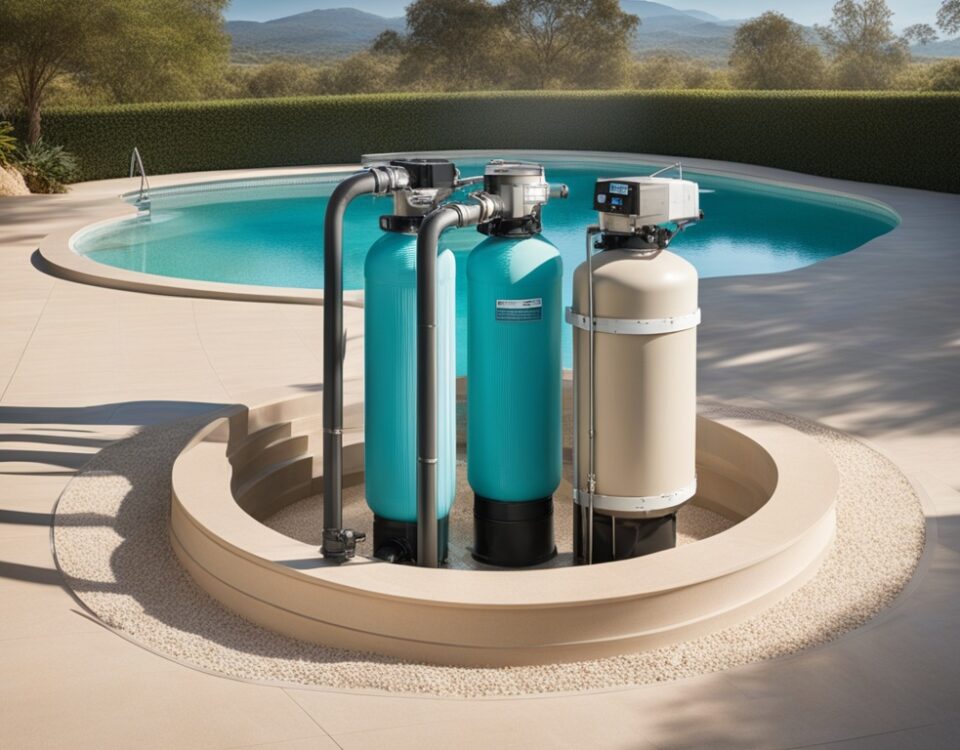Decoding Pool Heater Types: Your Complete Guide

Revamp Your Routine: Ultimate Pool Cleaning Schedule Guide
May 13, 2025
Rainy Mess? Quick Tips to Revive Your Pool After the Storm!
May 14, 2025Overview of Pool Heater Types
When it comes to ensuring your swimming pool remains a comfortable oasis throughout the swimming season, selecting the appropriate heater is paramount. The three predominant types of pool heaters available on the market today are gas heaters, electric heaters, and solar heaters. Each type comes with its unique mechanism of operation and energy efficiency levels, making it crucial for pool owners to understand the differences before making a choice.
Gas Pool Heaters
Gas pool heaters are renowned for their *rapid heating capabilities*, making them an ideal solution for those who want to enjoy their pool on short notice. Operating on either natural gas or propane, these heaters use a combustion process to generate heat. The primary advantage of gas heaters is their ability to quickly heat a pool, typically raising the water temperature by several degrees within just a few hours. However, while their performance is reliable, they are often less energy-efficient than other options, resulting in higher operating costs over time.
Electric Pool Heaters
Electric pool heaters, commonly referred to as heat pumps, utilize electricity to transfer heat from the surrounding air into the water. This method of heating is significantly more *energy-efficient* compared to gas heaters, as heat pumps can produce three to five times more energy than they consume. However, electric heaters operate best in warmer climates and can struggle to adequately heat the pool in cooler temperatures. Consequently, while electric heaters may have a lower upfront cost, their performance can fluctuate based on ambient temperatures.
Solar Pool Heaters
For eco-conscious pool owners, *solar pool heaters* represent a sustainable and cost-effective heating solution. These systems harness energy from the sun through solar panels, converting sunlight into heat. Although the initial investment in solar technology may be higher than gas or electric heaters, the long-term savings on energy bills and minimal operating costs often justify the expense. The effectiveness of solar heaters, however, depends significantly on geographical location and consistent sunlight exposure, making them less viable in regions with frequent cloudy weather.
| Type of Heater | Heating Speed | Energy Efficiency | Operating Costs |
|---|---|---|---|
| Gas Heater | Fast | Moderate | High |
| Electric Heater | Moderate | High | Medium |
| Solar Heater | Slow | Very High | Low |
In summary, when exploring the diverse options in pool heaters, it is essential to weigh factors such as *heating efficiency*, *initial costs*, and *operating expenses*. Each heating system caters to different needs and conditions, and understanding their operational nuances will aid in making an educated decision tailored to your specific scenario.
Ultimately, a well-informed choice can enhance the enjoyment of your pool while mitigating energy costs, establishing an inviting aquatic retreat that sustains comfort regardless of the season.
Gas Pool Heaters
Gas pool heaters are a popular choice among pool owners due to their *efficiency* and *quick heating capabilities*. These heaters utilize natural gas or propane to warm the water in a swimming pool, making them an excellent option for those looking to extend their swimming season or enjoy a warm soak even during cooler months. The process is relatively straightforward: when you activate the heater, gas is ignited in a combustion chamber, producing heat that is transferred to the water as it circulates through the unit. This method allows for swift heating, which is particularly advantageous in regions with fluctuating temperatures.
How They Work
The core mechanism of gas pool heaters involves a *heat exchanger*, where water from the pool flows through and absorbs heat generated from the burning gas. As the water leaves the heater, it is significantly warmer, allowing for rapid temperature adjustments. This system is ideal for larger pools or those requiring frequent heating, as it can increase the water temperature by several degrees in just a matter of hours. Furthermore, modern gas heaters come with advanced controls that enable precise temperature regulation, ensuring optimal comfort and energy efficiency.
Pros and Cons
While gas pool heaters are celebrated for their *speed and effectiveness*, they do have notable drawbacks. Among the primary advantages are:
- Rapid Heating: Gas heaters can heat water quickly, reaching desired temperatures significantly faster than electric options.
- High Efficiency: Gas heaters typically have high thermal efficiency rates, resulting in low heat loss during operation.
- Large Volume Heating: Ideal for larger pools where substantial amounts of water need to be heated quickly.
On the contrary, some disadvantages include:
- Operational Costs: Depending on local gas prices, operational expenses can add up quickly.
- Environmental Impact: Gas heaters contribute to carbon emissions, making them a less eco-friendly option compared to heat pumps or solar options.
- Installation Requirements: They may necessitate gas line installation and compliance with local building codes.
Cost of Installation and Operation
The *cost of installing a gas pool heater* typically ranges from $2,500 to $4,500, depending on the model and any necessary additional work, such as gas line installations. Operational costs vary based on usage and local energy prices, but homeowners should anticipate spending anywhere from $150 to $300 a month during peak usage times. It is essential for potential buyers to evaluate these costs alongside their budget and heating needs.
Popular Brands and Models
When considering a gas pool heater, several reputable brands stand out in the market. Noteworthy models include:
- Hayward H-Series: Renowned for their reliability and energy efficiency, these heaters are highly rated among pool owners.
- Pentair MasterTemp: Known for its user-friendly interface and compact design, this model is perfect for smaller spaces.
- Raypak Digital: Offers a combination of durability and advanced digital controls, making it a favorite for both residential and commercial pools.
In summary, gas pool heaters offer a viable solution for pool enthusiasts looking for immediate heating capabilities, though they come with considerations regarding costs and environmental impact. Evaluating the various options available can ensure that homeowners select the best type of heater to meet their specific needs.
Electric Pool Heaters
When it comes to heating your swimming pool, electric pool heaters stand out as a popular choice due to their simplicity and efficiency. These heaters utilize electrical resistance to warm the water, allowing for a consistent and reliable temperature. The mechanism is relatively straightforward: electrical energy heats a coil within the unit, which in turn warms the surrounding water as it circulates through the system. This method provides a practical solution for pool owners seeking convenience and effective heating.
Advantages of Electric Pool Heaters
One of the primary *advantages* of electric pool heaters is their ability to provide precise temperature control. Unlike gas heaters, which may have fluctuating temperature issues, electric heaters maintain a steady warmth that caters to your comfort. Moreover, they are often more environmentally friendly, especially when paired with renewable energy sources such as solar panels. Additionally, electric heaters require less maintenance compared to other types, as they have fewer moving parts, leading to a longer lifespan.
Disadvantages of Electric Pool Heaters
Despite their benefits, electric pool heaters also have their *drawbacks*. One significant consideration is their initial installation cost, which can be higher than that of gas heaters. Furthermore, their operational costs can be considerable, particularly in areas with high electricity rates. This can discourage users from relying solely on electric heating, especially during colder months when the need for warmth is paramount.
Electric Pool Heater Types
Electric pool heaters can be categorized into two main types: resistance heaters and heat pumps. Resistance heaters work by converting electricity directly into heat, making them quick to respond when a temperature change is needed. On the flip side, heat pumps use electricity to move heat rather than generate it, making them more energy-efficient over time. While heat pumps can take longer to heat the pool initially, they tend to be cheaper to operate in the long run.
| Type of Electric Heater | Initial Cost | Operational Cost | Heating Time |
|---|---|---|---|
| Resistance Heater | $1,500 – $3,000 | Moderate | Quick |
| Heat Pump | $3,000 – $6,000 | Low | Slow |
Top Recommendations for Electric Pool Heaters
For those considering an electric pool heater, several models deserve particular attention. The Hayward Universal Electric Heater is celebrated for its robust performance and energy efficiency. Another commendable option is the Pentair MasterTemp 125, which provides excellent heating capabilities while maintaining a user-friendly interface. Lastly, the Intex Solar Heater is an eco-friendly option that harnesses solar power to heat your pool, making it a budget-savvy choice for environmentally conscious users.
Solar Pool Heaters
Solar pool heaters represent an *innovative and eco-friendly* solution for pool owners seeking to extend their swimming season while minimizing energy costs. These systems harness the abundant energy of the sun to warm pool water, offering a sustainable alternative to traditional heating methods such as gas and electric heaters. This approach not only reduces reliance on fossil fuels but also contributes to a decreased carbon footprint, making it an attractive option for environmentally-conscious individuals.
How Solar Pool Heaters Work
Solar pool heaters utilize a simple mechanism to heat water. They consist of solar panels, typically installed on a roof or a nearby ground location, that collect sunlight and convert it into heat. Water from the pool is circulated through these panels, where it absorbs the solar energy and returns to the pool, resulting in a comfortably warm swimming experience. Standard solar pool heating systems can raise the water temperature by 10 to 15 degrees Fahrenheit, depending on the amount of sunlight available and the efficiency of the system.
Investment and Cost-Effectiveness
While the initial investment for solar pool heaters can be *significant*, typically ranging from $3,000 to $7,000 depending on the size of the pool and the system chosen, the long-term savings are undeniable. Homeowners can significantly reduce or even eliminate their monthly heating bills, which can accumulate to substantial savings over a few years. Given the ongoing increases in energy prices, the return on investment becomes *increasingly attractive*.
Case Studies and Success Stories
Various residential and commercial installations have demonstrated the efficacy of solar pool heaters. For instance, a family in California installed a solar heating system on their pool, experiencing a reduction of their energy bill by nearly 50% during the swimming season. Similarly, a resort in Florida reported that switching to solar heating not only cut heating costs but also enhanced guest satisfaction and environmental credibility. Such case studies illuminate the potential of solar pool heaters, proving that the benefits extend beyond mere cost savings.
Sustainability Benefits
The sustainability benefits of solar pool heaters are manifold. By shifting to solar energy, homeowners contribute to *reducing greenhouse gas emissions*, while also promoting renewable energy sources. Additionally, solar heaters often operate with minimal maintenance due to their simplified mechanical design, leading to fewer environmental impacts over their lifespan. Collectively, these factors position solar pool heaters as an *exemplary choice* for the environmentally minded, elevating the overall attractiveness of pool ownership in a greener future.
Cost-Saving Opportunities and Incentives
In addition to long-term savings, many regions offer incentives for installing solar pool heating systems, including tax rebates, grants, and local utility programs. These financial perks can sometimes offset the initial costs significantly, making solar heaters more accessible. For instance, homeowners in certain states may qualify for rebates that cover up to 30% of the installation costs. Therefore, thorough research into local incentives can enhance the affordability and appeal of investing in a solar pool heating solution.
| Type of Solar Heater | Initial Cost | Annual Savings | Expected Lifespan |
|---|---|---|---|
| Flat-Plate Collectors | $3,000 – $5,000 | $1,000 – $2,000 | 10 – 20 years |
| Evacuated Tube Collectors | $5,000 – $7,000 | $1,000 – $2,500 | 15 – 25 years |
Heat Pump Pool Heaters
Heat pump pool heaters are increasingly recognized as a *more energy-efficient alternative* to traditional heating methods, such as gas or electric heaters. Unlike conventional systems that generate heat, heat pumps function by extracting *ambient heat* from the air or ground, transferring this heat to the water in your pool. This innovative approach not only lowers energy consumption but also minimizes environmental impact, making heat pump heaters a prudent choice for eco-conscious pool owners.
How Heat Pump Pool Heaters Work
At the core of a heat pump pool heater’s efficiency is the *thermodynamic cycle*, which utilizes a refrigerant to absorb heat from the surrounding environment. The process begins with the refrigerant absorbing heat as it vaporizes within the evaporator coils, even in cooler temperatures. The vapor is then compressed, raising its temperature significantly. This high-temperature gas is subsequently passed through the condenser, where it releases its heat into the pool water before returning to its liquid state and repeating the cycle. This closed-loop system makes heat pumps remarkably efficient, often boasting an impressive coefficient of performance (COP) rating.
Environmental Impact
One of the foremost advantages of heat pump pool heaters is their *environmental sustainability*. By utilizing ambient heat, these systems reduce reliance on fossil fuels, thus significantly lowering greenhouse gas emissions. In an era where *climate change* poses imminent challenges, opting for a heat pump can contribute to a greener planet. Furthermore, many manufacturers are designing heat pumps with ozone-friendly refrigerants, minimizing further environmental risks and aligning with global efforts for sustainability.
Long-Term Cost-Effectiveness
While the initial investment for a heat pump pool heater might exceed that of conventional systems, the long-term savings are considerable. Heat pumps tend to operate *at a fraction of the cost* of gas-fired systems due to their high efficiency. With average energy costs rising, the ability to warm a pool using significantly less electricity translates into lower monthly bills. Over time, many homeowners find that the reduced operational costs not only balance but often surpass the initial financial outlay.
Performance in Various Climates
Heat pump pool heaters excel in temperate climates but can still provide effective heating in cooler regions. Many modern units are designed to operate efficiently in temperatures as low as 40°F (4°C). However, their efficiency decreases in extremely cold conditions. In such cases, supplementary heating methods may be required. It’s essential for pool owners to consider their local climate when choosing a heat pump, as *regional variations* will impact both performance and efficiency.
| Feature | Benefits | Considerations |
|---|---|---|
| Energy Efficiency | Lower operational costs, eco-friendly | Higher initial investment |
| Operating Temperature Range | Effective in moderate climates | Less efficient in extreme cold |
| Environmental Impact | Reduced carbon footprint | Requires electricity to operate |
In summary, heat pump pool heaters represent a *smart investment* for pool maintenance, balancing energy efficiency, environmental responsibility, and long-term cost savings. With their ability to adapt to varying climatic conditions and innovative designs, they are poised to lead the way in sustainable pool heating solutions.
Hybrid Pool Heaters
Hybrid pool heaters represent a cutting-edge solution in the realm of swimming pool heating, merging the benefits of two or more heating methods to maximize efficiency and minimize operational costs. By intelligently combining technologies such as heat pumps, gas heaters, and solar panel systems, hybrid systems deliver optimal performance in various climates and usage scenarios.
How Hybrid Pool Heaters Function
At the heart of a hybrid pool heater’s innovative design is its ability to switch between heating sources based on environmental conditions and user preferences. For instance, during warmer months, a heat pump may serve as the primary heating source while the gas heater functions as a backup during cooler periods. This flexibility allows pool owners to harness the most efficient heating method at any given time, thereby enhancing overall energy savings.
Unique Features of Hybrid Pool Heaters
One of the standout features of hybrid pool heaters is their ability to integrate seamlessly into existing pool systems. Many models come equipped with advanced controls and smart technology that enable users to monitor and strategize their heating strategy remotely. Additionally, hybrid systems often possess built-in self-diagnostic tools that alert homeowners to maintenance needs, ensuring optimal function, and prolonging the lifespan of the unit.
Benefits of Hybrid Systems
- Energy Efficiency: By leveraging the benefits of both gas and electric heating methods, hybrid systems significantly reduce energy consumption and operating costs.
- Environmental Impact: Utilizing a hybrid approach reduces reliance on fossil fuels, making it a more eco-friendly option for conscientious consumers.
- Cost-Effectiveness: Initial installation costs may be higher than traditional systems, but the long-term savings on energy bills typically outweigh this investment.
Considerations for Installation
While the benefits of a hybrid pool heater are compelling, several considerations must be taken into account before installation. First and foremost is the initial investment; hybrid systems tend to have higher upfront costs due to their complex design and technology. Potential buyers should also evaluate their climate—areas with milder temperatures can maximize the benefits of heat pumps, while regions with harsher winters may require more reliance on gas heating.
Furthermore, the installation of a hybrid system necessitates space for various components, including external units for heat pumps and necessary connections for gas lines. Engaging a knowledgeable technician is essential to ensure proper installation, which can greatly influence the system’s performance and efficiency. By understanding these nuances, pool owners can make informed decisions that cater to their specific needs and maximize their investment.
| Type of Heating Method | Efficiency | Best Used In |
|---|---|---|
| Heat Pump | High | Mild Climates |
| Gas Heater | Moderate | Cooler Climates |
| Solar Heater | Variable | Sunny Areas |
Choosing the Right Pool Heater for Your Needs
Selecting the most suitable pool heater is a decision that hinges on several pivotal factors, such as pool size, climate, budget, and energy efficiency goals. Whether you possess an expansive swimming pool that demands robust heating capabilities or a modest plunge pool that requires minimal warmth, understanding your unique requirements is essential to making an informed choice.
Assessing Pool Size
The first step in determining the right pool heater is to evaluate the size of your pool. Larger pools require more powerful heaters to reach the desired temperature effectively. An essential formula for rough calculations is to determine the heater’s BTU (British Thermal Units) requirement. For example, a general rule of thumb is to multiply the pool’s surface area (in square feet) by 20, which provides an estimate of the BTU output needed to raise the temperature by 1°F in 24 hours.
| Pool Size (Square Feet) | Recommended BTU |
|---|---|
| 300 | 6,000 |
| 600 | 12,000 |
| 1,000 | 20,000 |
Climate Considerations
Your geographical location plays a crucial role in selecting a pool heater. In warmer climates, where the swimming season is extended, a *solar pool heater* may be a feasible and eco-friendly option due to its reliance on renewable energy. Conversely, if you reside in a region with cooler winters, a *gas or electric heater* may be necessary for achieving rapid heating capabilities, ensuring you can enjoy your pool regardless of the season.
Budget Constraints
Your budget significantly affects your purchasing decision. While solar heaters often have a higher upfront cost, they can lead to significant savings on energy bills in the long run. On the other hand, gas heaters are typically less expensive initially but can incur higher operational costs. Assessing both initial investment and long-term expenses will guide you toward a choice that aligns with your financial capabilities.
Energy Efficiency Goals
Many homeowners are increasingly conscious of the environmental impact of their energy consumption. If you’re committed to *energy efficiency*, look for heaters with a high Energy Efficiency Ratio (EER). Heaters with a high EER rating not only save you money over time but also contribute to a reduction in your carbon footprint. Consider investing in a heater that aligns with your *sustainability goals* while providing adequate warmth for your pool.
Expert Recommendations
To make an informed decision, consult with a pool professional or conduct thorough research. Online forums, customer reviews, and expert recommendations can provide valuable insights into the experiences of other pool owners when selecting a heater. Additionally, familiarize yourself with the warranties and support options available with each heater type, as they can significantly impact your long-term satisfaction and performance.
Learn more about Swimming Pool

Javier Morales is passionate about pool design, maintenance, and outdoor living. With years of hands-on experience, he offers practical tips, creative ideas, and expert insights to help readers make the most of their pool spaces. At Piscina Planet, Javier shares everything from seasonal care guides to the latest trends in pool innovation.




